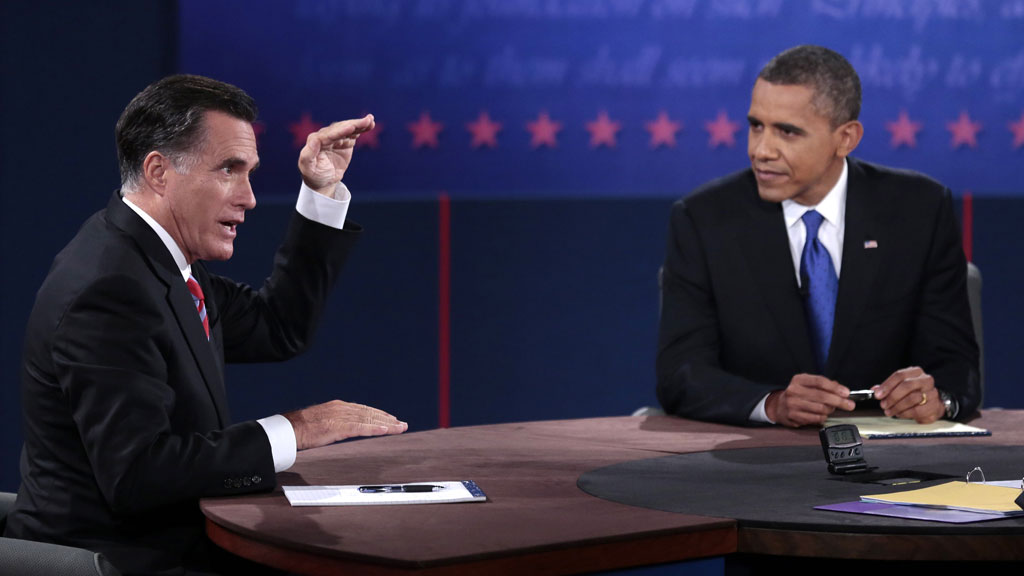Bayonets, horses, and Mitt’s quest for world peace
Foreign policy was never going to be a hot election issue. But as Obama and Romney squared up in their final debate, the candidates were, quite literally, all over the map.

If you believe the instant polls, Obama won the third debate, although it may not matter much. This was the broccoli debate: the worthy stuff of many a foreign policy wonk’s dreams, but hardly a decisive factor for most voters.
If anything, the clash merely continued the narrative of the last encounter: a feisty, even snarky Obama, rapping out those one-liners and smirking at his opponent: one choice quote – “The 1980s are calling, they want their foreign policy back”.
Right from the start, Obama managed to deploy his trump card, refering to his experience as commander in chief several times, and calling out Romney for trying to spread America’s resources too thin: “Your strategy previously has been all over the map.”
The 1980s are calling, they want their foreign policy back. Barack Obama
As for Romney, he was still running towards the centre, going out of his way to praise White House policies and swerving well away from any hint of warmongering. “Our purpose is to make the world is more – is peaceful,” he insisted. “We want a peaceful planet. We want people to be able to enjoy their lives… not be at war.”
All of which alarmed some conservatives, like the National Review editor Rich Lowry, who tweeted: “How many times has Romney said the president is right tonight. I thought he shld try to be a little above the fray, but this is a bit much”.
It wasn’t all peace and love, of course. Romney scored one good line when he warned Obama: “We can’t kill our way out of this mess,” and accused him of launching an “apology tour” of the Middle East.
Obama hit right back at that one, dismissing it as “the biggest whopper that’s been told during the course of this campaign”. That got the word “whopper” trending on Facebook.
We can’t kill our way out of this mess. Mitt Romney
Take a look at social media, where the debate failed to have anything like the same impact of the first two, due in part to the subject matter, but mainly to the fact that there were two major sporting events competing for public attention
Here, though, Obama emerged the clear winner, thanks to his zinger of the night, as he mocked Romney’s line about the US having fewer warships than it did a hundred years ago.
“Well, Governor”, he said, in condescending tones, “we also have fewer bayonets and horses, because the nature of our military’s changed. We have these things called aircraft carriers, where planes land on them. We have these ships that go underwater, nuclear submarines.”
Within seconds, #bayonetsandhorses was trending on Twitter, generating more than 105,000 tweets a minute. Within minutes, the canny Obama communications team had bought the sponsored hashtag, thus putting themselves at the centre of the most popular national conversation.
According to Google, horses and bayonets was by far the highest search term, followed by Syria and Mali. Wait – Mali? Yes, the relatively unknown West African state was mentioned not once, but twice, by Mitt Romney, as the source of a potential new al-Qaeda threat.
Geography teachers everywhere must have been delighted; not that the comedian Bill Maher was buying into it.
Mitt, you do know that most of America thinks Mali is one of Obama’s daughters, right?
— Bill Maher (@billmaher) October 23, 2012
At the end of it all, almost half of those who watched thought Obama won, a third plumped for Romney and one in five either thought it did not matter, had fallen asleep, or had switched to the Game 7 baseball playoffs.
There were no major gaffes. Nobody pledged to bomb Iran, nobody failed to name the president of Uzbekistan. Obama successfully hammered home his experience, while Republican leaders were confident Mitt Romney had made himself look intelligent, reasonable and presidential.
Now the distraction of the debates is out of the way, it is straight back to the campaign trail for the two men, with an exhausting dash through those swing states.
World affairs have had their brief moment in the spotlight. It is unlikely you will hear more about Mali – or bayonets – again.
Felicity Spector writes about US affairs for Channel 4 News
